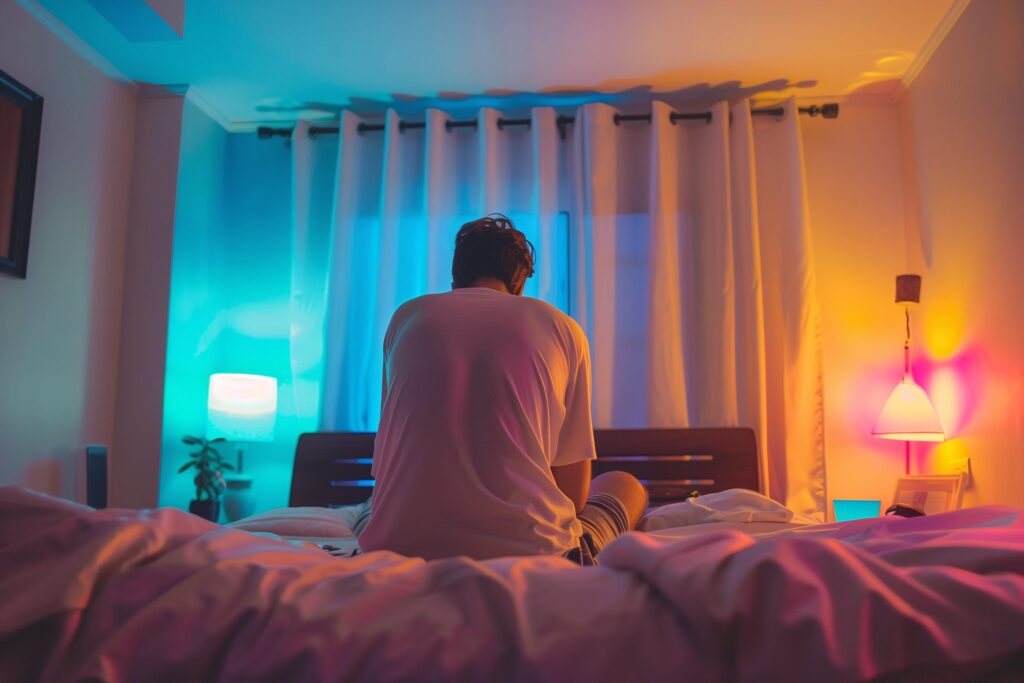
Hypnosis as a Tool for Managing Sleep-Related Anxiety and Stress
Struggle with sleep-related anxiety and stress? Explore practical tips and techniques to enhance your sleep and well-being naturally with hypnosis.

Did you know that sleep disturbances are a common occurrence for up to 20% of Americans? Interestingly enough, these disruptions are also tied to anxiety, often indicating whether someone suffers from anxiety. If you struggle with anxiety and stress due to sleep, you are not alone in this matter, but there are many things you can do to combat these problems. One of the most valuable methods to combat and manage sleep-related anxiety and stress is hypnosis.
Hypnosis can be used to help with issues like insomnia and other sleep challenges, which is what we will explore in this article today. We’ll discuss some practical steps you can take to help with your sleep-related anxiety and stress. Additionally, we’ll cover how hypnosis can help you and why, as well as how you can customize your routine to help you sleep better at night. If you’re ready to learn more, read on!
The Power of Hypnosis: A Cost-Effective Tool for Improved Well-Being
Hypnosis remains one of the most underutilized methods to help with sleep challenges, anxiety, and stress. As a non-pharmacological intervention, you can use hypnosis to help you relax and unwind, providing the perfect transition into sleep (Source: PubMed). It has been used by people of all ages—as young as elementary school-aged kids, as old as grandparents, and those in their later years. Not only that, but it is very cost-effective and offers fewer side effects compared to other modalities, like medications.
In several studies, hypnosis has been shown to provide benefits for those looking to improve their sleep. Most scholars have confirmed that hypnosis benefits sleep. There are even researchers who have determined that hypnosis can help with reducing pain and emotional distress and even limit one’s use of medication over time. Even those who struggle with irritable bowel syndrome could benefit from hypnosis! With so many pros to using hypnosis, here’s how you can integrate it into your sleep routine to reduce anxiety and stress before sleep.
How to Benefit from Hypnosis: A Look at Your Options
If you’d like to incorporate hypnosis into your sleep routine, there are a few ways that you can do it. First, you could search for a reputable hypnotist or a hypnotherapist in your area. These are individuals who have studied hypnotherapy and have become experts in the field.
You should look for those who have specific credentials, then reach out to them to consult and see if they are a good fit for your needs. Depending on where you are located, you may be able to have your hypnotherapist covered with insurance, but prepare for out-of-pocket expenses if needed. However, it can be hard to see your hypnotherapist at the right time to help with sleep, which leads us to self-hypnosis.
How to Use Self-Hypnosis to Benefit Your Sleep-Related Stress and Anxiety
Alternatively, for those who would like to engage in self-hypnosis, it is relatively easy to complete this task on your own. There is no difference usually found between those who engage in self-hypnosis versus group training sessions or regular visits with a hypnotherapist, so you will still benefit from the same side effects after your session (Source: PubMed). Additionally, if you practice self-hypnosis, you might actually become more empowered and enhance your autonomy!
Here's how you can use self-hypnosis to benefit your sleep and alleviate stress and anxiety:
- Induce Hypnosis: The first stage of hypnotizing yourself is to complete the induction phase, which generally involves listening to the voice or guidance of a hypnotherapist. During this stage, breathe deeply, close your eyes, and listen to the audio you have selected for your session.
- Deepen Your Hypnosis: As you get deeper into a hypnotic state, your audio or hypnosis track will likely ask you to focus on an object, visualize, or begin to countdown from ten to one. Listen to these stages, relax, and allow yourself to let go and become fully involved in the hypnosis.
- Listen to the Guidance: Once you have allowed yourself to be fully hypnotized, listen to the guidance of the hypnotherapist or audio that you have selected. These could include positive affirmations or suggestions to help you manage symptoms. If you choose the right audio, it can help you manage your anxiety or stress!
- Emerge from Hypnosis: After a brief amount of time, you will be asked to come out of your hypnosis. This is when you will be guided, just as you were before, to emerge from your altered state. Then, you will come back to full consciousness and be prepared to rest or take on another activity before you go to sleep.
Additional Tips to Enhance Your Hypnosis Session
There are so many apps and audio to choose from; it’s best to experiment and find the best option for you. If you struggle with more anxiety, you can select something focused on mitigating these symptoms. Alternatively, if you experience a lot of stress and need to wind down, find some sleep-related hypnosis tracks that can provide you with a safe space to unwind and relax.
Most importantly, you’ll want to make this a daily habit. You won’t know if hypnosis will work for you until you’ve done it for a few days, so be sure to commit to at least a week or more to make sure you know if it works or if you need to try a new recording or hypnotherapist. For best results, try to squeeze in your hypnosis session at least one hour before bed!
As long as you keep consistent and focus on improving your sleep-related concern, you’ll notice a difference, feel more rested, and you can sleep well once again every single night.
Use Hypnotherapy to Help with Your Sleep-Related Challenges
Whether you struggle with anxiety or stress before bed, you can use tools like hypnotherapy to help you rest and relax. While it might not work immediately, you can test this for at least a week or more to ensure you feel its effects. If not, make adjustments and keep trying! The most important thing is finding a routine that works for you. We hope that this article provided you with plenty of inspiration to help with your sleep-related anxiety and stress! How will you use this modality as part of your bedtime routine?

Written by
Marie Soukup
Marie Soukup is a seasoned copywriter, editor, and Integrative Nutrition Health Coach with a certificate from the Institute of Integrative Nutrition (IIN). With years of experience working with brands across diverse industries, Marie is passionate about holistic health and crafting compelling content.
Download Pillow
Get help
Press & News
Legal
Connect
X (Twitter)
Company
Copyright © Neybox Digital Ltd.



